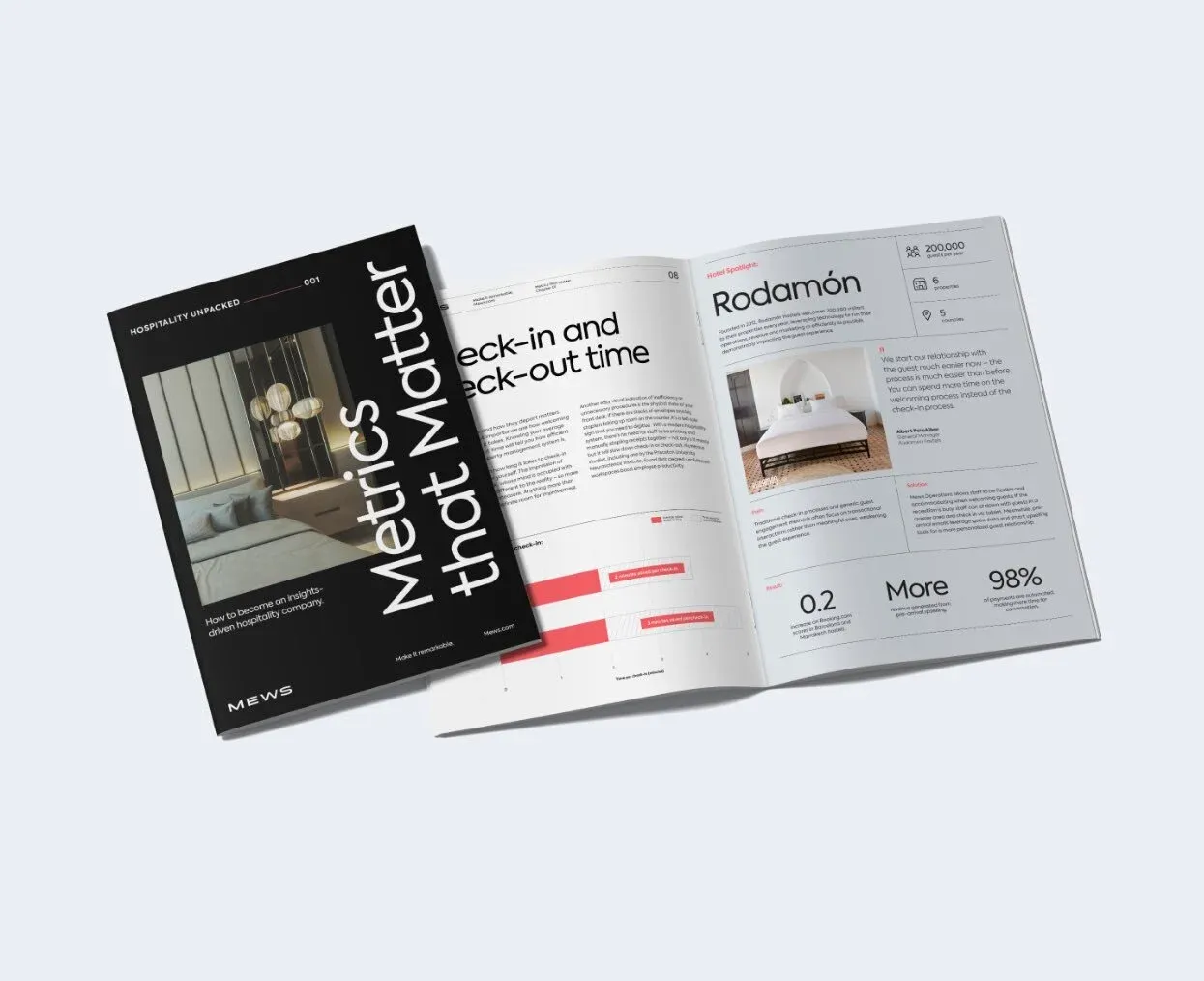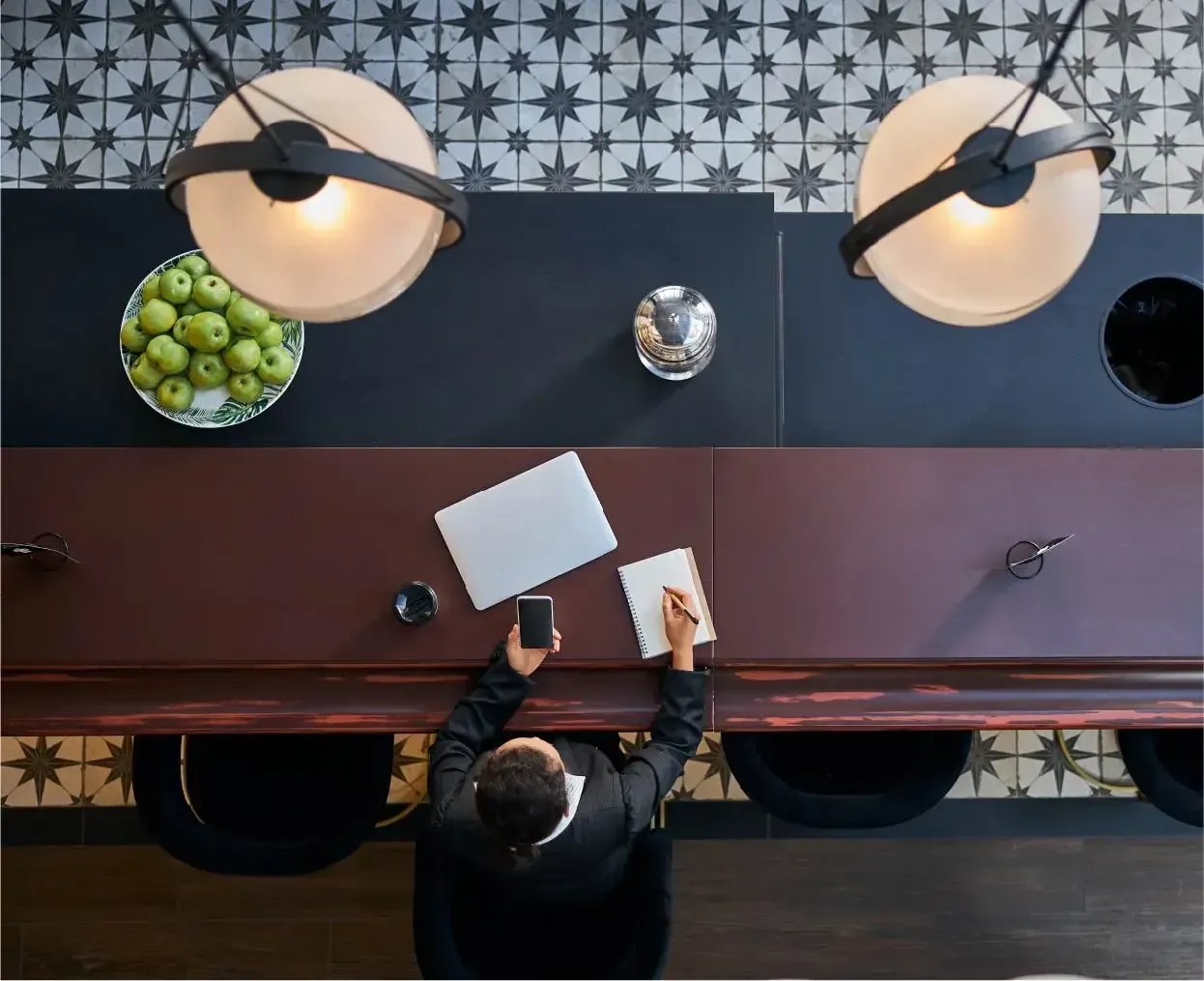Understanding what comprises a good hotel profit margin is key to running a successful business in the hospitality sector. The margin considered is usually the net amount, which is after paying salaries and covering overhead costs. On a general basis, this number should grow year over year because it speaks to how profitable and operationally efficient your business is, and ideally, over time your hotel should be more profitable and more efficient.
In this article, we’ll dig deeper into profit margins: what they are, why they matter, and what’s considered a solid net profit margin in the hotel industry. We’ll also guide you through calculating your hotel’s profit margin and share ten effective strategies to help boost it. Sound good?
What is a hotel’s profit margin?
A hotel’s profit margin is a measure of its overall profitability after covering essential operating expenses – like staff salaries, maintenance, marketing, utilities, property tax, and other overhead costs.

Why is hotel profit margin important?
A hotel’s profit margin is a key indicator of its financial health and operational efficiency. A high margin shows that a property is turning more of its revenue into profit, reflecting strong performance and well-managed operations.
Profit margins are impacted by many factors, including location, market demand, competition, and seasonality. By understanding these influences, hoteliers can make informed decisions that drive profitability and resilience. A close eye on margins helps spot growth opportunities and potential challenges, providing insights that lead to better financial outcomes and more sustainable success.
What is the average profit margin in the hotel industry?
The hotel industry typically operates with relatively low profit margins due to the high fixed costs needed to keep a property running smoothly. These fixed costs cover essentials like staffing, maintenance, rent, utilities, and inventory, all of which are crucial for providing a quality guest experience but can quickly chip away at profitability.
While the average profit margin in the hotel industry fluctuates from year to year depending on market trends, it is safe to say that an average hotel profit margin lies at around 10%. Between 2014 and 2021 this rate has been as high as 14.71% in 2016, and at record lows in 2020 according to CSI Market trends by industry.
What is a good net profit margin for a hotel?
As a general rule, a healthy profit margin lies at around 10%. 5% is considered a low margin, and 20% is a high margin. Hotels can compensate for a low profit margin by trying to get a higher revenue per booking through ancillary revenue and upselling. You can learn more about how to drive ancillary revenue here.
Knowing the industry average for profit margins is essential for understanding how your hotel stacks up against broader trends and identifying key areas for improvement. By benchmarking against these standards, you can better determine where to focus efforts to enhance profitability—whether through cutting unnecessary costs, optimizing resource allocation, or making more efficient use of both human resources and utilities.

How to calculate your hotel’s profit margin?
To calculate your hotel’s profit margin, use the following formula:
Profit Margin = (Net Profit / Total Revenue) x 100
Here’s a breakdown of the components:
Net Profit is total revenue minus all expenses, which includes operating costs, payroll, utilities, taxes, maintenance, and other overheads.
Total Revenue is the income generated by the hotel from all sources, such as room sales, food and beverage services, events, amenities, and other offerings.
Total Revenue expresses the income generated by the hotel, including room sales, food and beverage, events, amenities and other services.
To find your profit margin as a percentage, divide your net profit by your total revenue, then multiply by 100. This percentage reflects how much of your revenue translates into profit after covering all necessary costs. Net profit reveals what remains after subtracting business expenses, while revenue represents the full scope of sales, encompassing both primary and ancillary revenue streams.
10 strategies to improve your hotel's profit margin
There are many things to consider when talking about profit margins in hotels, from your pricing strategy to your own hotel’s margins, costs and operating expenses. Let's take a look at ten of the most effective strategies to boost your hotel’s profit margin.
1. Reduce overhead costs and operating costs
A big reason why hotels face low profit margins is the significant cost of operations. Balancing cost-efficiency with service quality is key, and one of the most effective ways to improve profit margins is by lowering overheads.
Start by making energy efficiency a priority: solar power, energy-efficient appliances, and motion sensors in rooms and public areas can reduce utility bills without compromising guest comfort. Switching to energy-efficient lighting and implementing occupancy sensors further reduces variable costs.
Another approach is to streamline labor management by optimizing staffing levels, outsourcing strategically, and negotiating robust vendor contracts for better rates. Automation can also cut down overheads, reducing the need for additional staff and freeing up time for essential tasks. Managing inventory and controlling supplies with precision are additional ways to improve margins, as is careful negotiation with vendors to ensure you’re getting the best rates possible.
2. Forecast staffing needs
Labor typically makes up around half of a hotel’s operating costs, so accurate staffing forecasts are essential. This ensures you’re neither overstaffed nor understaffed, both of which can impact profits and guest experience.
Cross-train your staff so that during low-occupancy periods, they can fill roles elsewhere, ensuring all areas are adequately covered.
It’s vital to strike a balance, as cutting staff to save costs often leads to service issues, frustrating guests who expect attentive care. By predicting demand and scheduling staff accordingly, you can optimize staffing levels to meet service needs efficiently and avoid unnecessary labor costs.
3. Practice revenue management
One of the key ways to maximize profit and to run a successful hotel is to understand and optimize revenue. Revenue refers to the number of rooms you sell in any given period of time, which can be optimized with the right hotel revenue management system. With a revenue management tool, you can choose the rates according to demand, optimizing your inventory in order to maximize profits.
A successful revenue management strategy involves setting the right rate for the right room at the right time, allowing you to reach your ideal guests without leaving money on the table. When aligned with demand, revenue management enhances profit margins by improving occupancy at ideal rates, maximizing the financial potential of your rooms.

4. Implement competitive pricing strategies
Pricing is crucial to your hotel’s profit margin. If you price rooms too low, you risk a thin margin that may not even cover operating expenses. However, sometimes it’s better to leave a room unoccupied than to charge a rate that doesn’t meet costs.
To maintain competitiveness, compare your hotel’s prices to similar properties and adjust rates based on demand—discounting when necessary, especially in slower periods. A competitor-based pricing strategy helps you set rates that better reflect current.
5. Find ways to boost RevPAR
With room rates constantly fluctuating, optimizing RevPAR becomes essential to maximizing revenue potential. By increasing either the occupancy rate or the room rate, you can achieve a higher RevPAR without significantly raising costs, since fixed expenses remain largely unchanged regardless of occupancy. The more you’re able to spread these fixed costs across occupied rooms, the higher the revenue per room - ultimately leading to better profit margins.
6. Leverage automation
Automation is a game-changer for profit margins. With a PMS like Mews, you can streamline a wide range of operational tasks that would typically demand substantial overhead and high labor costs. For a single monthly fee, a PMS can handle check-ins, reservations, room assignments, guest billing, revenue management, staffing, and more - all in one tool. This setup allows your team to operate efficiently without requiring a large staff, freeing up resources and cutting costs while still delivering a seamless guest experience.
7. Diversification
Relying only on room bookings can be risky, especially during low seasons when revenue dips. To keep income steady year-round, it’s essential to diversify revenue streams. Think about hosting occasions like weddings or graduation parties during quieter months or creating special packages that attract different audiences. Building connections with the local community can also help position your hotel as a hub for locals, encouraging them to see it as a go-to spot for celebrations, dining, or events.
8. Reduce turnover
Reducing turnover is essential to managing costs and maintaining service quality. Creating programs that offer competitive benefits, career growth opportunities, and ongoing training fosters engagement and makes employees feel valued. Retention programs not only save on the expenses and time involved in training new hires but also build a positive work environment that can boost both loyalty and productivity. When your team is committed and well-trained, it has a direct impact on guest satisfaction and profitability.
9. Optimize marketing spend
Marketing can be one of the biggest expenses for a hotel after payroll, so finding ways to optimize your marketing spend is essential. Focus on investing in campaigns targeted at your most profitable segments to get the highest return on investment. Strengthening your own booking channels - through strategies like social media, SEO, loyalty programs, and direct booking incentives - can also reduce dependency on OTAs, helping you cut costs while attracting more direct, repeat guests.
10. Control inventory and supplies
Inventory and supplies can quickly become a significant operational expense. One way to manage this is by negotiating contracts with vendors for essentials like toiletries, cleaning products, and linens, allowing you to secure volume discounts. Using your PMS to track inventory closely can help you reduce waste and only reorder when necessary, streamlining costs. Sustainable choices, like refillable soap and shampoo dispensers, not only benefit the environment but also offer cost savings over time, making them a smart long-term investment.
Conclusion
In this article, we’ve explored hotel profit margins—what’s considered a good margin, industry averages, and ten strategies to improve profitability. In a highly competitive space with limited margins, it’s crucial to fine-tune pricing strategies, manage revenue effectively, and keep a close eye on operational costs to spot areas that impact profitability.
Encouraging direct bookings, enhancing the guest experience, and investing in smart hotel management software can all play a role in maximizing profitability. Direct bookings help lower client acquisition costs, boosting margins, while a great guest experience fosters repeat visits and loyalty, helping your hotel stand out from the competition.
Download our guide The Metrics that Matter

Written by

Eva Lacalle
Eva a plus d’une décennie d’expérience internationale dans le marketing, le marketing numérique, la communication et l’événementiel. Lorsqu’elle ne travaille pas, elle aime surfer, danser ou explorer le monde.










